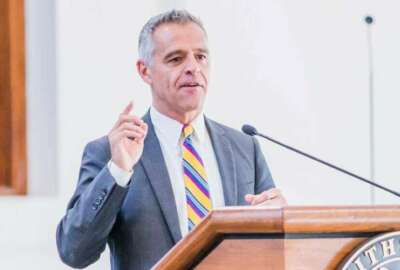The Morning Federal Newscast is a daily compilation of the stories you hear Federal Drive hosts Tom Temin and Emily Kopp discuss throughout the show each day. The Newscast is designed to give FederalNewsRadio.com users more information about the stories you hear on the air.
- The Postal Service has begun buyout talks with its biggest union. The American Postal Workers Union said it has had informal conversations and hasn’t discussed any official offers. The union said other outstanding issues needed to be settled first. It didn’t go into more detail on its website, but the cash incentive was likely to be a sticking point. Another union — the National Postal Mail Handlers — agreed to a $15,000 buyout deal for its members. The agency is offering slightly more — $20,000 — to select postmasters, but the government standard is $25,000. (APWU)
- A federal judge told the Food and Drug Administration to rethink a decision about use of antibiotics in farm animals. It was the second bench ruling to go against the FDA. The agency had decided not to start the process of disapproving the use of penicillin for animal feed. Reuters reported several interest groups thought the drugs end up making human infections resistant to antibiotics. They petitioned the FDA to withdraw approval. FDA said the process would be too expensive and time consuming. The judge said that decision was arbitrary and capricious. (Reuters)
- Can a hunger strike end a stalemate on Capitol Hill over the Postal Service? Five protesters think so. The current and former postal workers said they would begin their fast in a couple of weeks. A hunger strike was appropriate because, they said, the Postal Service was being starved to death by a law that required it to pre-pay retiree health benefits. The agency agreed that the requirement was a major reason why it was strapped for cash. But it cited other labor costs too, and that didn’t sit well with these protesters. They wanted the agency to suspend plans to cut its rolls and close facilities. (Community & Postal Workers United)
- The Obama administration is clamping down on salaries at state and local public housing authorities. It’s setting caps and expanding limits originally imposed by Congress. The Housing and Urban Development Department conducted a nationwide survey and came up with a salary cap of $155,000. The cap applies to the portion of executive pay the federal government reimburses. The survey showed, one housing official in Atlanta received nearly $650,000 one year, but most earn less than the new cap. (Federal News Radio)
- School districts do not seem to be buying the Agriculture Department’s claim that “pink slime” is perfectly fine. The Department of Agriculture said only three states in its National School Lunch Program have chosen to buy the product, also known as “lean, finely textured beef.” Those are Iowa, Nebraska and South Dakota, where pink slime is made. Schools had served up pink slime for decades until a recent public outcry. In response, for the first time, USDA gave schools a choice to purchase beef without the slime, which is used for a filler. It was still accepting orders for the upcoming school year. The agency maintained that pink slime was safe, affordable and low in fat. (Federal News Radio)
- The General Services Administration has picked a contractor to overhaul its online travel management service. The 15-year contract, which is worth $1.4 billion, went to Concur Technologies. E-Gov Travel Service first launched in 2002. Since then, it’s consolidated 250 travel systems governmentwide. GSA said the next version would automate travel planning and authorizations and would sport a new user interface. Concur is replacing three incumbent contractors. (Federal News Radio)
- NASA wants to make it easier for foreign partners to access its critical data. Under a test program it will launch this summer, NASA hopes to shorten access time from months to days. NASA will install a technology known as desktop virtualization that encapuslates critical data and makes it available without foreigners needing direct access to NASA’s internal networks. That’s considered a cybersecurity risk. CIO Adrian Gardner said 350 interns will also join the test. (Federal News Radio)
- The Supreme Court sided with the Secret Service in a case involving two agents, an anti-war protester and former Vice President Dick Cheney. The agents were protecting Cheney at a Colorado shopping mall when protester Steve Howards approached them, he said, to tell the vice president about his political views, the Associate Press reported. Agents said he also touched Cheney on the shoulder. They arrested Howards and he sued them for violating his rights. Lawyers for the Secret Service argued that agents should be shielded from these types of lawsuits. The justices did not go that far in their opinion, but they said the agents could not be sued here because the law was unclear. (AP)
- Congress wants more details about your paycheck, specifically, whether or not you’ve received a bonus in the past four years. Sen. Claire McCaskill (D-Mo.) is leading the investigation and she asked the Office of Personnel Management to list the number of bonuses that agencies have handed out and their dollar amounts. She also wanted to know what OPM was doing, or could do, to make sure federal workers did not receive bonuses if they were under investigation by their agency’s inspectors general. McCaskill recently released findings showing 84 employees at the General Services Administration received financial awards, even though they were under investigation and then found guilty of misconduct. (Federal News Radio)
Copyright
© 2024 Federal News Network. All rights reserved. This website is not intended for users located within the European Economic Area.




